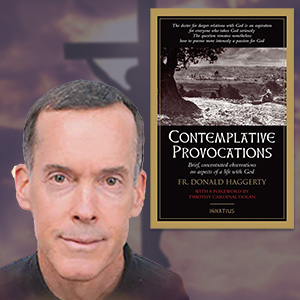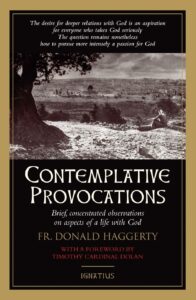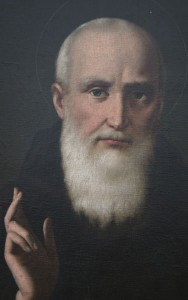Podcast: Play in new window | Download (Duration: 4:30 — 3.2MB) | Embed
Subscribe: Apple Podcasts | Spotify | Amazon Music | Android | Pandora | iHeartRadio | JioSaavn | Podchaser | Gaana | Podcast Index | Email | TuneIn | Deezer | Anghami | RSS | More

Reflection 4 – Seeking God’s Face – Reflections from Contemplative Provocations by Fr. Donald Haggerty – Discerning Hearts Catholic Podcasts
God is never so hidden for long, provided our eyes are open. Indeed no one grows in faith without finding signs of God’s help and intervention in daily life, small favors that could be dismissed as chance until we begin to notice their frequency. Fragmentary, perhaps, seemingly unlinked, these quiet signs reveal a personality of great kindness in God. But even more, they may reinforce the pain of those times when his concealment seems to be again steady and enduring.
Christian revelation is the mystery of divine personhood gazing at us from a human face. Yet it may be that sometimes in prayer we embrace an idea of God’s mystery in too exaggerated a manner and forget to keep our eyes on Jesus of Nazareth—even if no exchange of glances takes place and we are finally left staring at someone departing. The mystery of the eternal God hides in that human face. Often it must be sought where the divinity of Jesus Christ was most concealed, in the hours at Calvary when his face was marred and disfigured and he spoke for long interludes nothing but from his eyes.
Perhaps the saints became holy because they never made peace with the impossibility of seeing God in this life. Among the poor, or in the midst of hostile or indifferent souls, they went in search of his face, only to return again to the silence of prayer where God once more hid himself. These souls lived as though always on the verge of finding a treasure and never succeeding. Blind and groping, cast back into darkness after refusing every partial vision—this was always preferable to taking comfort in a brilliant shadow.
If we desire deeper prayer, should we not also learn to pass through the crowds in secret, unnoticed by others, drawing no attention? The desire to be unknown and hidden, concealed from sight, is not simply a monkish inclination. It is an impulse that arises with deeper prayer. This desire has a certain logic in the nature of love. We seek in love a God who has a penchant for hiding himself, and we are drawn to follow him into his own hiding places.
Haggerty, Donald. Contemplative Provocations: Brief, Concentrated Observations on Aspects of a Life with God (pp. 29, 31-32, 33-34). Ignatius Press. Kindle Edition.
Discerning Hearts Daily Contemplative Prompts
How can we become more open to recognizing God’s subtle signs in our daily lives, especially during times of perceived concealment?
Reflecting on the practice of seeking God in humility and hiddenness, how can this Lenten season help us draw closer to the mystery of His love?
 Obtain a copy of the book here
Obtain a copy of the book here
A great many religious people undertake a serious dedication to prayer. They are moved by a longing for a deeper encounter with God that beckons them as a distant light at night on the sea. Yet far fewer become true contemplative souls, for it is difficult to continue the quest for God in the face of many obstacles.
For those who are spiritually courageous and full of desire for God, this book will provoke them to persevere in this ultimate adventure in life-the more complete discovery of the living God. Thematically unified by the notion of God’s ultimate transcendence to our limited human knowledge, this work offers a rich profusion of insights on the life of prayer and the pursuit of God.
A key to spiritual growth is the understanding that the hiddenness of God becomes a paradox in the experience of a soul seeking him wholeheartedly. Rather than enjoying a more intimate familiarity with God, the soul advancing in prayer is likely to experience more intensely the concealment of God. This surprising truth undergirds true contemplative prayer. It is a reason why every contemplative soul, and every saint, is inflamed with a never satisfied thirst for God.

 Saturday after Ash Wednesday – A Time of Lectio Divina for the Discerning Heart Podcast
Saturday after Ash Wednesday – A Time of Lectio Divina for the Discerning Heart Podcast

 Friday after Ash Wednesday – A Time of Lectio Divina for the Discerning Heart Podcast
Friday after Ash Wednesday – A Time of Lectio Divina for the Discerning Heart Podcast

 Thursday after Ash Wednesday – A Time of Lectio Divina for the Discerning Heart Podcast
Thursday after Ash Wednesday – A Time of Lectio Divina for the Discerning Heart Podcast Ash Wednesday – A Time of Lectio Divina for the Discerning Heart Podcast
Ash Wednesday – A Time of Lectio Divina for the Discerning Heart Podcast